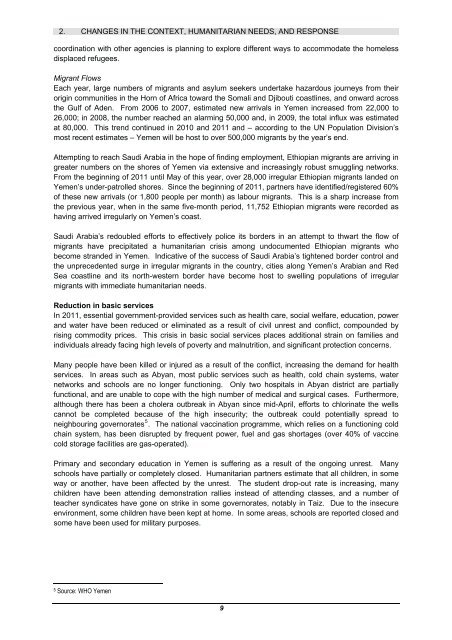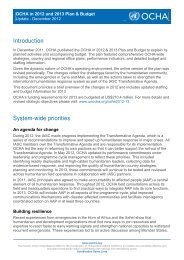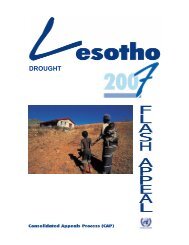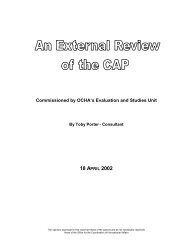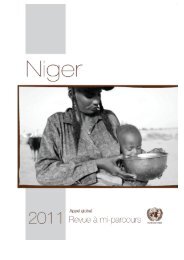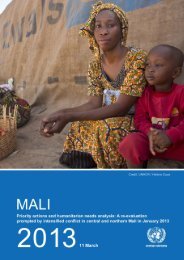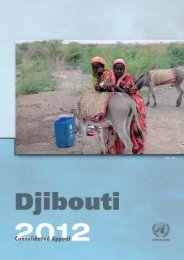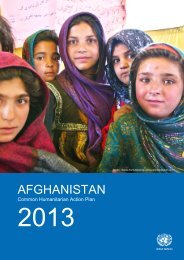Yemen 2011 Mid-Year Review - UN OCHA Webmail
Yemen 2011 Mid-Year Review - UN OCHA Webmail
Yemen 2011 Mid-Year Review - UN OCHA Webmail
- No tags were found...
Create successful ePaper yourself
Turn your PDF publications into a flip-book with our unique Google optimized e-Paper software.
2. CHANGES IN THE CONTEXT, HUMANITARIAN NEEDS, AND RESPONSEcoordination with other agencies is planning to explore different ways to accommodate the homelessdisplaced refugees.Migrant FlowsEach year, large numbers of migrants and asylum seekers undertake hazardous journeys from theirorigin communities in the Horn of Africa toward the Somali and Djibouti coastlines, and onward acrossthe Gulf of Aden. From 2006 to 2007, estimated new arrivals in <strong>Yemen</strong> increased from 22,000 to26,000; in 2008, the number reached an alarming 50,000 and, in 2009, the total influx was estimatedat 80,000. This trend continued in 2010 and <strong>2011</strong> and – according to the <strong>UN</strong> Population Division’smost recent estimates – <strong>Yemen</strong> will be host to over 500,000 migrants by the year’s end.Attempting to reach Saudi Arabia in the hope of finding employment, Ethiopian migrants are arriving ingreater numbers on the shores of <strong>Yemen</strong> via extensive and increasingly robust smuggling networks.From the beginning of <strong>2011</strong> until May of this year, over 28,000 irregular Ethiopian migrants landed on<strong>Yemen</strong>’s under-patrolled shores. Since the beginning of <strong>2011</strong>, partners have identified/registered 60%of these new arrivals (or 1,800 people per month) as labour migrants. This is a sharp increase fromthe previous year, when in the same five-month period, 11,752 Ethiopian migrants were recorded ashaving arrived irregularly on <strong>Yemen</strong>’s coast.Saudi Arabia’s redoubled efforts to effectively police its borders in an attempt to thwart the flow ofmigrants have precipitated a humanitarian crisis among undocumented Ethiopian migrants whobecome stranded in <strong>Yemen</strong>. Indicative of the success of Saudi Arabia’s tightened border control andthe unprecedented surge in irregular migrants in the country, cities along <strong>Yemen</strong>’s Arabian and RedSea coastline and its north-western border have become host to swelling populations of irregularmigrants with immediate humanitarian needs.Reduction in basic servicesIn <strong>2011</strong>, essential government-provided services such as health care, social welfare, education, powerand water have been reduced or eliminated as a result of civil unrest and conflict, compounded byrising commodity prices. This crisis in basic social services places additional strain on families andindividuals already facing high levels of poverty and malnutrition, and significant protection concerns.Many people have been killed or injured as a result of the conflict, increasing the demand for healthservices. In areas such as Abyan, most public services such as health, cold chain systems, waternetworks and schools are no longer functioning. Only two hospitals in Abyan district are partiallyfunctional, and are unable to cope with the high number of medical and surgical cases. Furthermore,although there has been a cholera outbreak in Abyan since mid-April, efforts to chlorinate the wellscannot be completed because of the high insecurity; the outbreak could potentially spread toneighbouring governorates 5 . The national vaccination programme, which relies on a functioning coldchain system, has been disrupted by frequent power, fuel and gas shortages (over 40% of vaccinecold storage facilities are gas-operated).Primary and secondary education in <strong>Yemen</strong> is suffering as a result of the ongoing unrest. Manyschools have partially or completely closed. Humanitarian partners estimate that all children, in someway or another, have been affected by the unrest. The student drop-out rate is increasing, manychildren have been attending demonstration rallies instead of attending classes, and a number ofteacher syndicates have gone on strike in some governorates, notably in Taiz. Due to the insecureenvironment, some children have been kept at home. In some areas, schools are reported closed andsome have been used for military purposes.5Source: WHO <strong>Yemen</strong>9


